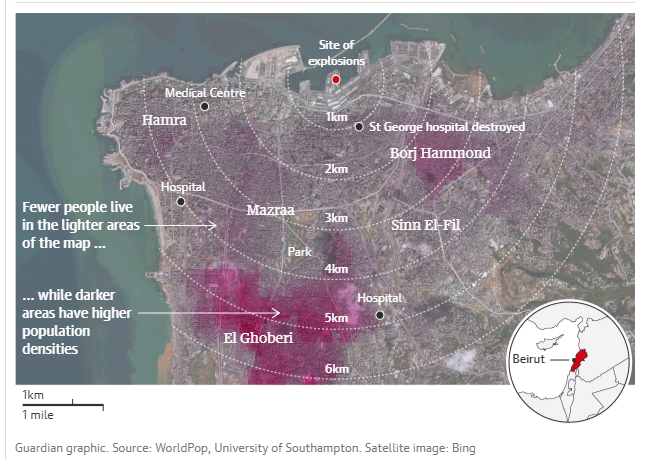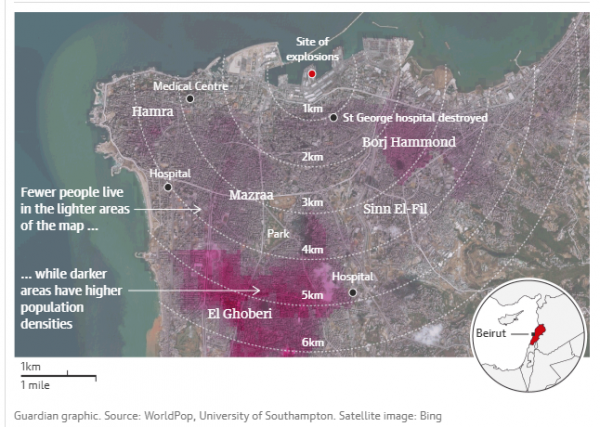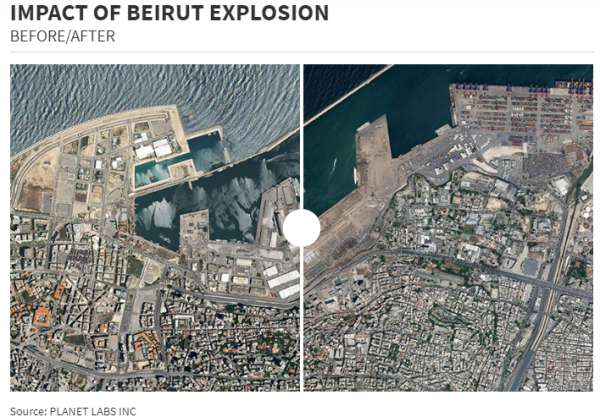Kim Kardashian Shared "End of Days" book paragraph which claim that Psychic Sylvia Browne Predicted the Coronavirus
- 06-05-2020
- News

On Tuesday, August 4, 2020, Beirut, the capital and largest city of Lebanon, was shattered by a massive explosion that ripped its port and outskirts causing mass casualties and destruction. The city has already been victim of numerous crises since decades including a devastating 15-year civil war, regional conflicts, political unrest, protests and economic free fall; and this deadly explosion amidst coronavirus pandemic has brought it to its knees. As per Lebanese TV reports, death toll has risen to 135 and about 5,000 people are wounded. The secretary-general of the Kataeb political party, Nazar Najarian, also got killed in it as per media reports.

Impact of blast
The blast created a 4.5-metre (15ft) tidal wave across the city registering a magnitude 3.3 earthquake that wobbled buildings even in west and south Beirut. According to Lebanese state media, over half the city has damaged including the official residence of the Lebanese president, the Baabda Palace.
Lebanon, a country sharing land borders with war stricken Syria and its bitter rival Israel, is dependent on Beirut’s port which is one of the few centers of active commercial activity during economic meltdown, and its crucial connect with the outer world. The country relies heavily on imports accounting for some 70% of the country’s foreign trade. With its biggest and busiest ports port getting destroyed in these blasts, authorities are now planning to divert shipments to Tripoli’s port in the north of the country but that is not capable enough to receive large shipments.
The explosion destroyed countries main grain silo leaving wheat reserves of less than a month’s consumption. However, the economy minister, Raoul Nehme, said that “There is no bread or flour crisis…We have enough inventory and boats on their way to cover the needs of Lebanon on the long term.”
The collective losses after Beirut's blast are being estimated to reach $10bn to $15bn including both direct and indirect losses related to business.

What caused the blast?
Initial reports suggested that a fireworks warehouse was involved. Later, Lebanon’s Prime Minister, Hassan Diab, confirmed that 2,700 tonnes of ammonium nitrate exploded after lying unsecured in a warehouse for six years, tallying with reports that a ship carrying a similar quantity of the chemical had unloaded its cargo at the port in 2013. It remains unclear what caused the chemical to ignite triggering these blasts in Beirut.
What is Ammonium Nitrate?
Ammonium nitrate is a common industrial chemical used mainly for fertilizer because it is a good source of nitrogen for plants, at the same time being the cause of numerous industrial explosions over the decades.
As per experts, Ammonium nitrate is an oxidizer and is not itself very combustible, it ignites only under the right circumstances and these are difficult to achieve. When combined with fuel oils however, it creates a strong explosion widely used in the construction industry, but at the same time misused by militant groups such as the Taliban as improvised explosives.
Despite being dangerous, it is a crucial chemical for agriculture and construction industries. That is why most countries follow very strict rules about where it can be stored: For example, it must be kept away from fuels and sources of heat and the storage facilities should be inspected periodically.
Government Efforts
Lebanon's cabinet declared a two-week state of emergency in the capital city and handed control of security to the military which has been directed to conduct patrols in impacted areas to ensure security.
The government has promised a transparent inquiry and decided to put an unspecified number of Beirut port officials under house arrest till the time it is being investigated as to how the highly explosive materials came to be stored near residential areas.
The Special Tribunal for Lebanon’s verdict in the trial over the 2005 bombing that killed former Lebanese Prime Minister Rafik al-Hariri scheduled earlier on August 7 has been postponed to August 18.
Lebanon's health ministry has said it will set up field hospitals to treat the injured people but he is still strategizing how to tackle the situation along with rising Covid-19 cases.
The Prime Minister has promised to hold the culprits accountable and called on "friendly countries" to support the nation. Meanwhile, the Israeli government has denied any involvement in the blasts and instead offered humanitarian and medical aid.
International Aid
In response to the deadly explosion, countries all across the globe have offered support and condolences. Some of them being - Qatar sent field hospitals; Jordan, Iran, US, Brazil offered assistance; Britain announced a $6.6m aid package; Australia committed to donate $1.4mn in humanitarian support to Lebanon, French president sent two planeloads of rescue workers and aid
United Nations expressed sympathies and said it is actively assisting in the response to horrific explosions in Beirut.
Indian Prime Minister Narendra Modi’s office also expressed grief: "Shocked and saddened by the large explosion in Beirut city leading to loss of life and property. Our thoughts and prayers are with the bereaved families and the injured”
Public Reaction – Government Negligence
Anger and disappointment in public is mounting in Beirut after reports revealed that this dreadful event was foreseeable and had been the subject of repeated warnings portraying government negligence in taking things seriously.
The enormous stash of ammonium nitrate held at the port since 2014 that caused this devastation was once described as a “floating bomb” that would “blow up all of Beirut” by officials inspecting the consignment. Badri Daher, the director-general of Lebanese Customs, told media that in the years that followed, his agency sent multiple warnings to judiciary about the hazardous material. “We requested that it be re-exported but that did not happen…We leave it to the experts and those concerned to determine why,” he said.
Lebanese government has formed a special committee to investigate the deadly blast. However, Marwan Hamadeh, a former Lebanese member of parliament has requested United Nations Security Council to consider creating an international inquiry committee and said, “Everybody has been appointed by the parties in power, and therefore, no judge is able to carry out an investigation on this really serious explosion".
Prosecutors in France have opened an "involuntary injury" using their jurisdiction to investigate acts committed abroad, after 21 French citizens were wounded in Beirut blasts, Paris prosecutor Remy Heintz said in a statement.
According to public reactions in social media, people are blaming the ‘so-called responsible people’ for ‘incompetence’. Alleged government negligence in these blasts has ripped open the unhealed wounds of people who were already frustrated at Lebanese government for rampant corruption drowning the country deep into debt and soaring economic crisis that slashed incomes and jobs and aggravated nationwide poverty. To sum up, in words of a Lebanese common man, “We’re cursed…Even if this was an accident, it’s the last thing we could afford.”